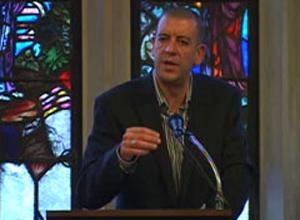Positive view of austerity could help turn Ireland around

Irish people can use the current crisis as an opportunity to effect positive and lasting change on our society, a public forum heard last night. By Alison Spillane.
Speaking to a packed auditorium in Liberty Hall theatre, Fintan O'Toole said, "We [Irish citizens] have the capacity to imagine a political project for ourselves".
Mr O' Toole said control was a crucial element in escaping the current situation. He drew attention to the widespread feeling that citizens' views are irrelevant. This loss of a sense of control is "hugely corrosive" he said, "socially, psychologically, and economically".
The Irish Times columnist was speaking at a discussion on his new book Enough Is Enough, released earlier this week. The other panellists at the event were historian Diarmaid Ferriter, head of Microsoft Ireland Paul Relis, Barnardos CEO Fergus Finlay and NUI Maynooth lecturer Mary Murphy, one of the chief organisers of last week's Claiming Our Future event at the RDS.
Commenting on the role of the Catholic Church in Irish society, Mr O'Toole pointed out that Ireland had a functioning primary school system before the Church took over this function. He spoke about the myth of charity whereby Irish people regard public services as gifts, bestowed not by the State but by the Church.
He said Irish citizens need to "take control of our own system of public provision" and he called for local, democratic control of primary schools. Mr O'Toole also spoke about the need for investment in early education saying every €1 invested in a child aged 0 - 5 saves €7 later on in life.
Austerity emerged as a key theme among last night's speakers. Both O'Toole and Ferriter referred to the late historian Tony Judt's idea of ethical austerity. O'Toole advocated a kind of seriousness about public morality in order to end "the culture of impunity".
He said, "Ireland is not more corrupt [than other countries], we just let people away with it." He added that a new notion of austerity was needed; one which would involve a revulsion of excess and consequences for those who treat the public interest as a joke.
Prof Ferriter (pictured) also referenced British historian David Kynaston, author of Austerity Britain: 1945 – 1951, commenting that Churchill didn't respond to the public need for a plan of recovery in post-war Britain and was thus defeated in the 1945 election.
Ferriter said there were two sides to austerity; the economic hardship the government has subscribed to but also the opportunity to look at how we might change things for the better. "There is perhaps a chance to take advantage of a crisis", he said.
Speaking in relation to the government's austerity measures, Fergus Finlay observed, "The obscene icon of austerity is a fleet of limos rolling up to Farmleigh". He also said that hopelessness is "more damaging, more corrosive than austerity".
Mary Murphy reinforced the point that Irish citizens have to the capacity to make a plan of recovery for themselves. She said Ireland may be poorer in the future but it could also be a more equal, fairer society.
